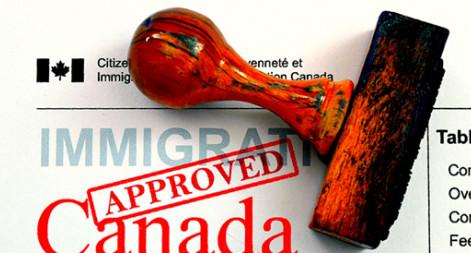There are several categories of immigrants who can apply to come to Canada, including skilled workers, family members of Canadian citizens or permanent residents, business people, and refugees/asylum seekers. The eligibility requirements vary depending on the category of immigration. In general, applicants must meet certain criteria related to language proficiency, work experience, education, health, and security checks.
Immigrate to Canada: A Comprehensive Guide to the Canadian Immigration System
If you’re considering immigrating to Canada, there are a number of different pathways available to you. This comprehensive guide will provide you with an in-depth overview of the Canadian immigration system, including the various categories of immigrants and their eligibility requirements.
The Canadian Immigration System
The Canadian immigration system is designed to attract skilled and talented individuals from all over the world who are interested in making a new life in Canada. The system is based on a points system, which evaluates potential immigrants based on a number of factors, including education, work experience, language ability, and age. Immigration, Refugees, Citizenship Canada (IRCC) processes Millions of applications to come to Canada or remain in Canada each year.
Categories of Immigrants
There are several categories of immigrants who can apply to come to Canada, including:
- Skilled Workers:
Skilled workers are individuals who have the education, work experience, and language abilities to make a significant contribution to the Canadian economy. To be eligible as a skilled worker, you must first complete an Express Entry profile and meet the minimum eligibility criteria.
- Family Class:
Family-class immigrants are sponsored by a close family member who is a Canadian citizen or permanent resident. To be eligible, you must be the spouse, common-law partner, parent, grandparent, or dependent child of the sponsor.
- Business Class:
Business class immigrants are individuals who have experience running a business and are interested in starting a new business in Canada or investing in an existing Canadian business.
- Refugees and Asylum Seekers:
Refugees and asylum seekers are individuals who are fleeing persecution or danger in their home country and are seeking refuge in Canada.
You might be interested in…
- How Immigration will shake up the Election and change the face of Canada forever
- LMIA Job fraud on the Rise as uncertainty with the Immigration system increases
- The shocking truth about Housing market in Canada. Are you affected?
Pathways to Immigrate to Canada:

There are several pathways to immigrate to Canada, including:
- Express Entry:
The Express Entry system is designed to attract skilled workers to Canada. Candidates create an Express Entry profile, which is then ranked against other profiles in the pool based on factors such as age, education, work experience, and language ability. The highest-ranked candidates are then invited to apply for permanent residence.
- Provincial Nominee Programs (PNPs):
Each province and territory in Canada has its own PNP, which is designed to attract skilled workers to the region. PNPs allow provinces and territories to nominate individuals who have the skills and experience needed in their local labour market.
- Family Sponsorship:
Canadian citizens and permanent residents can sponsor their close family members to come to Canada through the Family Class program.
- Humanitarian and Compassionate Grounds:
Individuals who do not meet the eligibility requirements of other immigration programs may be able to apply for permanent residence on humanitarian and compassionate grounds.
Who can Immigrate to Canada?
There are several categories of immigrants who can apply to come to Canada, including skilled workers, family members of Canadian citizens or permanent residents, business people, and refugees/asylum seekers. The eligibility requirements vary depending on the category of immigration. In general, applicants must meet certain criteria related to language proficiency, work experience, education, health, and security checks.
Immigrate to Canada through Express Entry:
The Express Entry system is one of the most popular immigration pathways for skilled workers who want to immigrate to Canada. The system is designed to fast-track the immigration process and allow eligible candidates to receive an invitation to apply for permanent residency in Canada within a matter of months.
To be eligible for the Express Entry system, candidates must create an online profile and complete an Express Entry application. An applicant does not need an LMIA-supported Job offer to Immigrate to Canada.
This application will evaluate a candidate’s education, work experience, language proficiency, and other factors to determine their eligibility for the program. Candidates who meet the eligibility criteria are then placed in a pool of potential candidates, where they are ranked based on a points-based system called the Comprehensive Ranking System (CRS).
The candidates with the highest CRS scores receive invitations to apply for permanent residency in Canada through regular Express Entry draws. The Express Entry system is a popular choice for many skilled workers because of its streamlined and efficient process, and the possibility of gaining permanent residency in a short period of time.
You might be interested in: IRCC’s unexpected Express Entry pause will cost Canada thousands of Skilled workers
Immigrate to Canada through Provincial Nominee Program:
Provincial Nominee Programs (PNPs) are a series of programs that allow Canadian provinces and territories to nominate skilled workers, business people, and graduates to immigrate to Canada. The PNP is designed to address specific labour market needs in different regions of the country and provides a pathway to permanent residency for those who meet the eligibility requirements.
Each province and territory has its own set of PNP streams and eligibility criteria, which can include work experience, education, language proficiency, and job offers from employers in that province or territory.
PNPs are designed to attract immigrants who have the skills and experience required to fill jobs in high-demand occupations in specific regions of the country. The programs can be a great option for those who do not meet the requirements for the federal government’s Express Entry system but still wish to immigrate to Canada. By participating in a PNP, candidates may receive a provincial nomination certificate, which can then be used to apply for permanent residency in Canada.
The PNP application process typically involves multiple steps, including an initial application to the province or territory, an evaluation of the candidate’s skills and qualifications, and an invitation to apply for permanent residency in Canada.
While the PNP process can take longer than the Express Entry system, it can provide a pathway to permanent residency in Canada for those who do not qualify for other immigration programs. Overall, the PNP is a key component of Canada’s immigration system and helps to attract skilled workers to regions that need them the most.
Immigrate to Canada through Family Sponsorship/Re-unification:
Family sponsorship is a unique pathway to immigrate to Canada for individuals who have close family members in Canada, such as a spouse, parent, or grandparent. The program is designed to help reunite families and bring loved ones together, while also contributing to Canada’s social and economic fabric.
Under the family sponsorship program, Canadian citizens and permanent residents can sponsor their relatives to come to Canada as permanent residents. The program is designed to ensure that families are reunited in Canada and can settle into a new life together.
There are a number of different categories of family sponsorship, each with its own set of eligibility criteria and requirements. These categories include spousal sponsorship, common-law partner sponsorship, and parental sponsorship.
The eligibility requirements for each category can vary, but generally require that the sponsor be a Canadian citizen or permanent resident, be able to demonstrate financial stability and provide support for the sponsored person, and that the sponsored person pass medical and criminal background checks.
Family sponsorship is a popular pathway for immigration to Canada and can be an exciting opportunity for individuals to reunite with their loved ones and build a new life in Canada. The program is a testament to Canada’s commitment to family values and helping to ensure that families stay together, no matter where they come from.
Immigrate to Canada through Humanitarian & Compassionate grounds:
The Canadian government has a program for those who are inadmissible to Canada for various reasons but can make a compelling case for being allowed to enter and stay in the country on humanitarian and compassionate grounds.
This program is designed to assist individuals who are experiencing unusual, undeserved, or disproportionate hardship in circumstances beyond their control, and who would face undue hardship if they were required to leave Canada.
Applications under this program can be made by people who are in Canada but are not refugees or permanent residents, as well as those who are outside Canada but have a strong connection to the country.
Under the Humanitarian and Compassionate Grounds program, applicants must demonstrate that they meet several eligibility criteria, including proving that they would experience significant hardship if they were to be removed from Canada. This could include factors such as separation from family members, medical conditions, or fear of persecution in their home country.
Additionally, applicants must show that they have strong ties to Canada, such as family members or a history of contributing to the community.
While the program can be complex and require significant effort to apply for, it can offer a lifeline to individuals and families who are facing serious challenges in their lives. The ability to stay in Canada on humanitarian and compassionate grounds can provide a level of stability and security that may not be available elsewhere and can allow individuals to build a new life in a welcoming and diverse country.
Eligibility Requirements: Immigrate to Canada
To be eligible to immigrate to Canada, you must meet certain requirements, such as:
- Language Proficiency:
You must be able to speak English or French fluently, as these are the official languages of Canada.
- Work Experience:
You must have at least one year of work experience in a skilled occupation.
- Education:
You must have completed at least a high school education.
- Health and Security:
You must undergo a medical exam and obtain a police certificate to ensure you do not pose a risk to Canadian society.
Benefits of Immigrating to Canada
There are many benefits to immigrating to Canada, including:
-
Universal Healthcare:
All residents of Canada are entitled to free healthcare, regardless of their immigration status.
- High Standard of Living:
Canada consistently ranks as one of the best places to live in the world, with a high standard of living and a diverse and inclusive society.
- Robust Economy:
Canada has a strong and stable economy, with plenty of opportunities for skilled workers and entrepreneurs.
- Welcoming Society:
Canadians are known for being friendly and welcoming to immigrants
How Much money do you need to Immigrate to Canada?
The amount of money you need to immigrate to Canada can vary depending on a number of factors, such as the immigration program you are applying under, the number of family members who are accompanying you, and the cost of living in the province or territory where you plan to settle.
For example, if you are applying for permanent residency through the Federal Skilled Worker Program, you must show that you have enough funds to support yourself and your family members who are coming with you to Canada.
The amount of funds you need to demonstrate can vary, but as of 2021, it is generally around $13,213 CAD for a single applicant and $16,449 CAD for a couple. You may need to show additional funds for each dependent child.
If you are applying under the Provincial Nominee Program, the amount of funds you need to demonstrate can vary depending on the specific program and province you are applying to. Some programs require a specific amount of funds, while others require that you demonstrate that you have enough funds to support yourself and your family for a certain period of time.
It’s important to note that the funds you demonstrate are not a fee or deposit, but rather an indication that you have enough money to support yourself and your family when you arrive in Canada. You will still need to find a job and establish yourself in Canada, but having the required funds can help to ensure that you have a smooth transition and can focus on settling into your new life in Canada.
Wrap up:
In conclusion, immigrating to Canada can be a life-changing opportunity for many individuals and families. Canada offers a welcoming and inclusive society with a high standard of living, excellent healthcare, and a robust economy.
With several pathways available for immigration, including the Express Entry system, Provincial Nominee Programs, Family Sponsorship, and Humanitarian and Compassionate grounds, there are options for individuals with different backgrounds and circumstances.
However, immigrating to Canada is not an easy process and requires careful planning and preparation. It is important to meet the eligibility requirements, which include language proficiency, work experience, education, and health and security checks. Additionally, the cost of immigration can vary depending on the pathway chosen, with some programs requiring significant financial resources.
With the right information, guidance, and resources, immigrating to Canada can be a rewarding experience. It is recommended to seek the help of a qualified immigration consultant or lawyer who can provide advice and support throughout the application process.
Overall, Canada’s immigration system is designed to attract skilled and talented individuals from all over the world, and those who meet the eligibility criteria have the opportunity to build a new life in a welcoming and diverse country.













